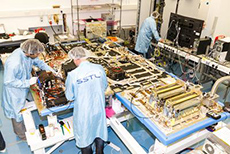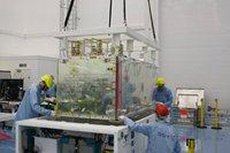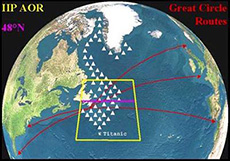Eurocontrol’s five millionth flight
Early in May EUROCONTROL’s Maastricht Upper Area Control Centre (MUAC) controlled its five millionth flight – KLM 577 from Amsterdam to Abuja, Nigeria – with its trajectory-based flight data processing system (FDPS), introduced in December 2008. The crew were informed of this milestone in the use of MUAC’s state-of-the-art technology which allows it to control over 5000 flights on a busy
day.
Improved passenger and cargo security
States from across the Middle East agreed in April on collective action to improve passenger and cargo security throughout the region, as part of a global initiative to counter threats to civil aviation worldwide.
Participants underscored the need to work more closely together in response to threats and incidents, and stressed that ICAO must continue to address, as a matter of priority, threats to the global air cargo system by enhancing supply chain security.
Olympics security airspace restrictions
The UK Civil Aviation Authority has confirmed the enforcement policy that will
be in place to deal with infringements of this summer’s Olympics security airspace restrictions.
The existing CAA policy of not generally pursuing a prosecution in cases when an airspace infringement is inadvertent, and the pilot has taken all reasonable steps to resolve the situation safely, will remain. However, as infringements of the security airspace are likely to have a significant impact on other airspace users, the licences of all pilots infringing either the Restricted or Prohibited Zone will be suspended pending an investigation of the incident.
PNT Ninth Meeting Report, November 9-10, 2011
Space-Based PNT Advisory Board Meeting on November 2011, was held prior to the IAIN officers’ meeting in London 23 of November where the undersigned has presented an oral report to the honorable IAIN member. However, the full comprehensive report of the meeting is published on the PNT site.
IMO Report to IAIN Officers, April 24, 2012
Relatively little time has passed since our last meeting in London. The next MSC meeting is to be held in May. The items mentioned in my previous as being sent forward to MSC for approval have thereby not yet met with such approval. This report therefore focuses on the next session of NAV that is the 58th meeting of the Sub Committee of Navigation (NAV 58) to be held from 2nd till 6th of July in London at IMO’s headquarters under the chairmanship of Mr Mike Sollosi (USA).
Report on the p&o meeting for the 7th Meeting of the International Committee on GNSS (ICG)
IAIN was represented by Elisabeth Fischer (OVN), participants: China, the European Space Agency, the European Union, India, Italy, Japan, Nigeria, the Russian Federation, the United Arab Emirates, the United States of America, the Bureau international des poids et measures (BIPM), the International Association of Institutes of Navigation (IAIN), the Civil GPS Service Interface Committee (CGSIC), the United Nations Office for Outer Space Affairs (UNOOSA), the Space Generation Advisory Council (SGAC)
Report on ICAO Activity in 2011
Air safety, Sustainable development of the industry and the environment remain ICAO priorities.
Report to the IAIN Officers’ meeting on IHO
IAIN participates to IHO conferences, which should become the Assembly when the new IHO convention is ratified1. IHO is an independent organization having the status of observer in UN and comprising 84 member states.
Minutes of the IAIN Officers’ meeting, April 24, 2012
A meeting of the IAIN Officers took place at 1500 on 24 Apr 12 in the Polish Baltic Philharmonic, Gdansk – prior to ENC 2012.
NTSB general aviation safety forum
On 7th May it was announced by the National Transportation Safety Board (NTSB) that it will hold a two-day forum on 19th and 20th June in Washington DC where will be discussed safety issues related to general aviation.
Commented Chairman Hersman, “Each year, hundreds of people are killed in general aviation crashes, and thousands more are injured. Tragically, the circumstances leading to these accidents are often repeated over and over, year after year. If we are going to prevent future fatalities and injuries, these common causes must be addressed.”
Galileo’s first payload ready
ESA announced on 19th April that the next Galileo navigation payload has been completed and is on its way to meet the satellite platform that will host it in orbit. The first of 14 Galileo Full Operational Capability (FOC) navigation payloads has been shipped from Surrey Satellite Technology Ltd in the UK to prime contractor OHB System AG in Bremen Germany.

These payload panels for the first Galileo Full Operational Capability satellite are undergoing final testing in the Assembly Integration Test hall at Surrey Satellite Technology Ltd in Guildford, UK, in April 2012 before being boxed up for shipment to prime contractor OHB in Germany. – Credits: SSTL 2012

The first Galileo Full Operational Capability flight model payload with its solar panels in their ‘boxed’ position, being lifted by crane into its shipping container at Surrey Satellite Technology Ltd in Guildford, UK in April 2012. This is the first of 14 Galileo FOC payloads to be transported to prime contractor OHB in Germany for integration with their satellite platforms. – Credits: SSTL 2012
The payload, the part of the satellite that provides Galileo’s precision
positioning measurements and services to users worldwide, will then be added to its waiting satellite platform.

The Search and Rescue antenna on the first Galileo Full Operational Capability satellite payload to be completed, at SSTL in the UK before its shipment to OHB in Germany. This antenna will pick up distress calls from around the globe and relay them to local authorities, as well as sending a notification back to those awaiting rescue, operating as part of the international Cospas-Sarsat system. – Credits: SSTL 2012
Titanic’s legacy reaches space

World’s busiest ice-covered sea – image courtesy of ESA
A century ago, RMS Titanic struck an iceberg while crossing the North Atlantic and sank at the cost of over 1500 passengers and crew. Today, thousands of vessels cross the same iceberg-ridden path with no loss of life – and satellites are helping.

The International Ice Patrol area of operation. This view of the North Atlantic and surrounding continents displays the International Ice Patrol’s Area Of Operations (AOR) in yellow from 40°N to 50°N, and 39°W to 57°W. The 48°N latitude line is drawn in purple within the Ice Patrol AOR. The transatlantic shipping lanes from Europe to North America are in red. Typical iceberg paths and distribution within the AOR are represented by numerous white triangles along the 200 m bathymetry from Greenland to the Grand Banks of Newfoundland. The position of the 1912 Titanic sinking is represented by a white asterisk at the tail of Grand Banks near the bottom of the Ice Patrol AOR. – image courtesy of IIP
ENVISAT services interrupted
After ten years of service, Envisat has stopped sending data to Earth. ESA’s mission control is working to re-establish contact with the satellite,
and made this announcement on 14th April. Although this landmark
mission has been in orbit twice as long as it was designed for, ESA hopes
to keep the satellite in service until the launch of the successor Sentinel
missions.
Passenger ship safety
Following the sinking of the passenger ferry Shariatpur-1, on 13th March after
being hit by a small cargo ship in the Meghna River, south-west of the Bangladeshi capital, Dhaka, IMO Secretary-General Koji Sekimizu offered his condolences and sympathies to the families of all those who lost their life.
Speaking to the Organization’s Sub-Committee on Radiocommunications and
Search and Rescue (COMSAR), in session last month the Secretary-General also
expressed the solidarity of IMO, at these difficult times, with the Government of
Bangladesh. He reiterated IMO’s readiness to respond to any request from
Bangladesh for assistance for technical co-operation.
The Netherlands / Eurocontrol co-operative agreement
From The Hague it was announced on 20th March that the Kingdom of the Netherlands and EUROCONTROL had signed a co-operation agreement for the provision by EUROCONTROL’s Maastricht Upper Area Control Centre (MUAC) of air traffic data services to the Royal Netherlands Air Force (RNLAF).
The Netherlands has some of densest and most complex airspace in the world. Optimum civil and military co-operation is therefore paramount to ensuring safe and high-performance civil and military air traffic services in a context of growing air traffic and more demanding military requirements.
IATA and Latin American aviation
At the end of March IATA announced from Santiago that it was urging governments and other stakeholders in Latin America to unite to give aviation the freedom to succeed by improving aviation safety, making badly needed investments in infrastructure and reducing the heavy tax burden on the industry.
ISO certification of ICAO Technical Co-operation Bureau
It was announce by ICAO in March that it had been certified to ISO 9001:2008
standard for quality management systems.
IFALPA supports ICAO Dangerous Goods Panel
In mid-February the International Federation of Air Line Pilots’
Associations (IFALPA) saluted the work of the Dangerous Goods Panel
of the International Civil Aviation Organization (ICAO) in advancing new
safety standards for the transport of lithium battery consignments.
Flight safety and volcanic ash
Air transport operators now have a scientific basis for decision making in the event of a volcanic eruption thanks to a manual published by ICAO and endorsed by industry partners.
Entitled Flight Safety and Volcanic Ash (Doc 9974), the manual provides guidance which States may recommend to aircraft operators when there is forecast volcanic ash contamination, placing the responsibility for such operations on the operator, under the oversight of the State regulatory authority.
ICAO Secretary General appointment
The Council of the International Civil Aviation Organization (ICAO) announced that Raymond Benjamin (France) has been appointed as Secretary General of the Organization for a second three-year term, from 1st August 2012 to 31st July 2015.
Mr. Benjamin was first appointed to the position on 1st August 2009. During his first term, he sharpened the focus of the Organization to make it more prominent and effective in its leadership role as the global policy-setting forum for international civil aviation.
Certification of ICAO Technical Bureau
On 19th March it was reported from Montréal by ICAO that the Procurement Section of its Technical Co-operation Bureau (TCB) has been certified to the ISO 9001:2008 standard for quality management systems.
A new generation of meteorological satellites
Europe’s next fleet of meteorological satellites is set to make its debut in 2017, following the signing on 24th February of the development contract. While Meteosat Third Generation will ensure full continuity with the current Meteosat satellite family, it will also introduce significant improvements.
IAIN position paper on LightSquared vs. GPS
The unexpected establishment of LIGHTSQUARED ground transmitters in the USA has caused concern within international circles. Essentially LightSquared uses frequencies adjacent to GPS frequencies with a serious risk of interference. This paper explains IAIN’s concerns. It is not a scientific paper but is based on scientific facts currently available from the US experiences.
Minutes of IAIN Officers’ Meeting, Nov, 28, 2011
Attached here as a PDF are the minutes of the Officers’ Meeting held on 28th November 2011 held at the Harpley Room, Grange Tower Bridge Hotel, London.
Also attached are the Treasurer’s Report, Reports from ICAO, IGC, IHO and IMO as well as the 2018 Congress update.
NTSB study – E-AB aircraft accidents
Throughout the 2011 calendar year, the (US) National Transportation Safety Board conducted a study of Experimental-Amateur Built (E-AB) aircraft to evaluate the safety of this growing and innovative segment of general aviation.
“The co-operation we have received from EAA and the E-AB community has been tremendous,” said NTSB Chairman Deborah A.P Hersman. She added, “Through this study, we hope that we will be able to give the innovators and aviators in the community information about accidents that will result in a real and immediate safety payoff for them when they are flying these aircraft.”
